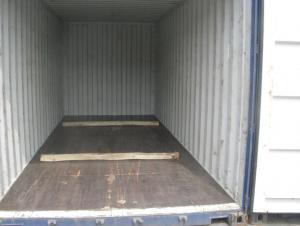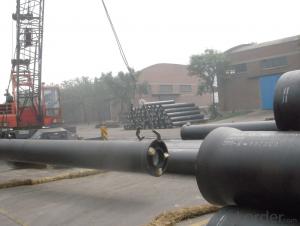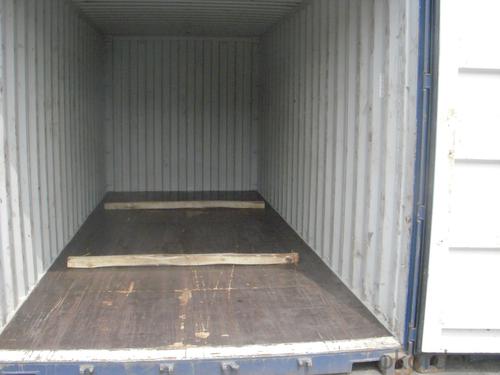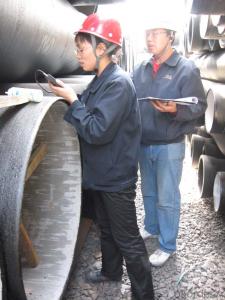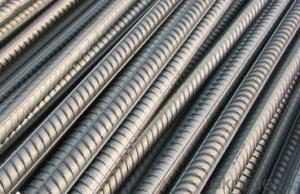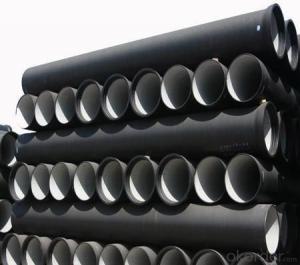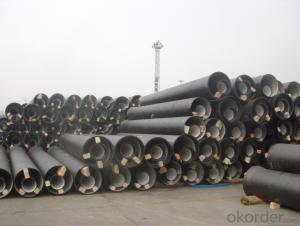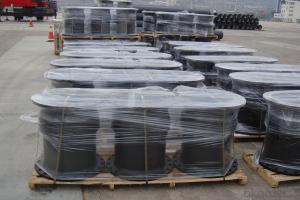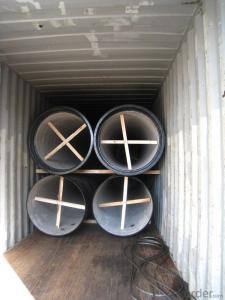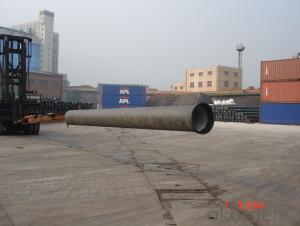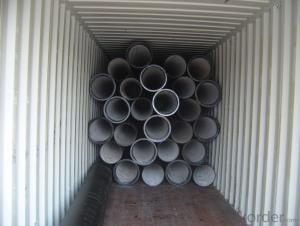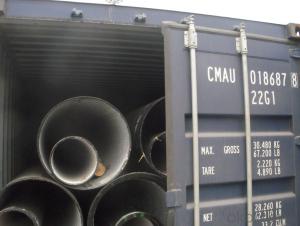DUCTILE IRON PIPES AND PIPE FITTINGS k8 CLASS DN1500
- Loading Port:
- Tianjin
- Payment Terms:
- TT OR LC
- Min Order Qty:
- 22 pc
- Supply Capability:
- 3000 pc/month
OKorder Service Pledge
OKorder Financial Service
You Might Also Like
Material : Ductile Cast Iron
Size Range : DN 80mm to DN 2000mm
Unit Effective Length : 6m or 5.7m
Manufacture Standard: ISO 2531:1998/ EN 545:2006/EN 598:2007
Annual capacity : 200,000 tons
Coating Exterior: Zinc 130g/m2 according to ISO 8179-1 and bitumen coating 70 microns.
Cement Interior: Portland Cement/ High Alumina Cement/ Sulphate Resisting Cement Lining according to ISO 4179
Special requirements on external coating and internal lining can be applied
We also provide accessories such as SBR/EPDM rubber gaskets, lubricant paste, pipe caps, PE sleeves, etc.
Additional Parts:
Each pipe is strictly inspected according to related standard to ensure permanently high performance.
Easy Installation at site and service free for life
Long Service Lifespan
Quotation will arrive you within 24hours once we get your inquiry.
We guarantee offering you a competitive price.
A copy of original inspection reports of pipes will be offered after shipment.
Photos of loading process will be sent to the customer after shipment effect.
We will follow-up the delivery progress after shipment effect and update to the customer on weekly basis.
- Q: How do ductile iron pipes perform in sandy soil conditions?
- Ductile iron pipes perform well in sandy soil conditions due to their inherent strength and durability. The material's high tensile strength allows it to withstand the pressure exerted by the surrounding soil, preventing pipe deformation and breakage. Additionally, the corrosion resistance of ductile iron ensures a longer lifespan, even in corrosive sandy soil environments.
- Q: Are ductile iron pipes suitable for irrigation systems in agricultural fields?
- Yes, ductile iron pipes are suitable for irrigation systems in agricultural fields. Ductile iron pipes have excellent strength, durability, and corrosion resistance, making them ideal for carrying water in irrigation systems. They can withstand high pressure and heavy loads, ensuring reliable water supply to agricultural fields for irrigation purposes.
- Q: What are the different methods for tapping ductile iron pipe?
- Tapping ductile iron pipe can be done in several different ways, depending on the project's specific needs. Some commonly used methods include: 1. Mechanical Tapping: To create a hole in the ductile iron pipe, a mechanical tapping machine is employed. Equipped with a rotating cutting tool, the machine easily cuts through the pipe wall, resulting in a clean hole. This method is ideal for smaller diameter pipes and is both quick and efficient. 2. Hot Tapping: While the ductile iron pipe is still in service and under pressure, hot tapping involves creating a hole. To ensure safety and maintain the pipe's integrity, specialized equipment and expertise are required. Hot tapping is commonly used when shutting down the pipeline for maintenance or repair work is impractical or not feasible. 3. Electrofusion Tapping: For larger diameter pipes, electrofusion tapping is a suitable method. It involves using an electrofusion saddle and fitting to create a branch connection on the ductile iron pipe. By welding a fitting onto the pipe with an electrofusion machine, a secure and leak-proof connection is achieved. This method can be used for both water and gas applications. 4. Saddle Tapping: A cost-effective and simple method for smaller diameter pipes is saddle tapping. It involves attaching a saddle or clamp onto the ductile iron pipe and drilling a hole through it. The saddle is then equipped with a threaded outlet to connect a branch line. 5. Split Sleeve Tapping: For larger diameter pipes, split sleeve tapping is commonly used. This method requires cutting a section out of the ductile iron pipe and installing a split sleeve over the cut. By bolting the split sleeve together, a secure and watertight connection is established. It is suitable for both water and gas applications. When selecting the tapping method, it is crucial to consider factors like pipe size, pressure rating, required branch connection, and project-specific requirements. Consulting a professional engineer or tapping specialist is highly recommended to ensure the correct method is used for tapping ductile iron pipe.
- Q: What are the environmental benefits of using ductile iron pipe?
- There are several environmental benefits associated with using ductile iron pipe in various applications. Firstly, ductile iron is a highly durable material that can withstand harsh environmental conditions and has a long lifespan. This means that ductile iron pipes require less frequent replacements compared to other pipe materials, reducing the need for resource-intensive manufacturing processes and minimizing the disposal of old pipes. Secondly, ductile iron pipes have excellent corrosion resistance properties, which reduces the risk of leaks and pipe failures. This not only prevents potential water contamination but also minimizes the wastage of water resources. Additionally, ductile iron is a recyclable material. At the end of its useful life, ductile iron pipes can be melted down and used to manufacture new products, reducing the demand for virgin materials and conserving natural resources. Furthermore, the manufacturing process of ductile iron pipe has improved significantly over the years, resulting in reduced energy consumption and emissions. Today, many manufacturers use energy-efficient technologies and practices to produce ductile iron pipes, contributing to a lower carbon footprint and reduced air pollution. Lastly, ductile iron pipes have a smooth internal surface that minimizes friction and allows for efficient water flow. This can lead to energy savings in pumping and distribution systems, as less energy is required to transport water through the pipeline network. Overall, using ductile iron pipe can have a positive impact on the environment by reducing waste, conserving resources, minimizing pollution, and improving energy efficiency in water distribution systems.
- Q: Do ductile iron pipes require cathodic protection?
- Indeed, cathodic protection is necessary for ductile iron pipes. Employing this technique safeguards metallic structures against corrosion by designating them as the cathode in an electrochemical cell. Ductile iron pipes face a high susceptibility to corrosion, particularly in harsh soil environments or when exposed to water that harbors substantial amounts of corrosive elements like chlorides or sulfates. By subjecting the pipe to a direct electrical current, cathodic protection effectively thwarts the innate corrosion process. This approach guarantees the durability and soundness of the ductile iron pipes, thereby diminishing the frequency of repairs or replacements.
- Q: Can ductile iron pipes be used for underground drainage systems?
- Indeed, underground drainage systems can utilize ductile iron pipes. Ductile iron, being a robust and enduring substance, exhibits resistance to corrosion, rendering it appropriate for subterranean applications. Possessing remarkable tensile strength, it can endure substantial loads and pressures, thereby making it an excellent choice for drainage systems that encounter significant flow rates or necessitate substantial burial depths. Moreover, ductile iron pipes boast an extended lifespan, thereby decreasing the requirement for frequent maintenance or replacement. All in all, ductile iron pipes prove to be an unwavering and efficient option for underground drainage systems.
- Q: How do ductile iron pipes handle ground settlement near construction foundations?
- Ductile iron pipes are renowned for their effectiveness in handling ground settlement near construction foundations. Their flexible nature enables them to withstand ground movement without suffering severe damage or failure. When the ground settles near construction foundations, it exerts pressure on the surrounding infrastructure, potentially causing shifts in the soil. Ductile iron pipes have the advantage of absorbing and distributing this pressure, minimizing the risk of pipe breakage or deformation. A significant factor contributing to the resilience of ductile iron pipes is their high tensile strength. This strength enables the pipes to maintain their structural integrity even under substantial external forces. Consequently, they can endure ground settlement without experiencing fractures or cracks. Moreover, ductile iron pipes possess a high level of flexibility. This flexibility allows them to adapt to minor ground movements and accommodate shifts in the soil without compromising their functionality. The pipes can bend slightly without breaking or causing leaks, ensuring a continuous flow of fluids and preventing disruptions to the construction project. Additionally, ductile iron pipes are commonly installed with appropriate bedding and backfill materials. This ensures that the pipes have a stable and secure foundation, minimizing the risk of movement and settlement. The use of these materials also helps distribute the load exerted on the pipes more evenly, further enhancing their ability to handle ground settlement. All in all, ductile iron pipes are an excellent choice for construction projects that involve concerns about ground settlement. Their strength, flexibility, and proper installation techniques allow them to effectively handle ground movement near construction foundations, resulting in reliable and long-lasting infrastructure.
- Q: What is the minimum cover requirement for ductile iron pipes?
- The minimum cover requirement for ductile iron pipes is typically determined by the specific project or engineering design considerations. However, as a general guideline, the minimum cover requirement for ductile iron pipes is often recommended to be at least 2 feet (or 0.6 meters) from the top of the pipe to the finished ground surface. This minimum cover requirement helps to provide adequate protection to the pipe from external loads, soil settlement, and potential damage from construction activities. It also helps to maintain the structural integrity and longevity of the ductile iron pipe system. It is important to note that local building codes, industry standards, and project specifications may dictate specific minimum cover requirements, so it is crucial to consult these resources for accurate and up-to-date information.
- Q: Are ductile iron pipes suitable for wastewater treatment plants?
- Yes, ductile iron pipes are suitable for wastewater treatment plants. Ductile iron is a strong and durable material that is resistant to corrosion, making it an ideal choice for handling wastewater, which can contain various corrosive elements. Additionally, ductile iron pipes have high tensile strength and can withstand high pressure, which is necessary for transporting wastewater in a treatment plant. The flexibility of ductile iron pipes also allows for easy installation and maintenance, reducing the overall cost and time required for a wastewater treatment plant. Overall, ductile iron pipes are widely used in wastewater treatment plants due to their durability, corrosion resistance, and ability to handle the demanding conditions present in such facilities.
- Q: Can ductile iron pipes be repaired if they get damaged?
- If ductile iron pipes sustain damage, it is indeed possible to repair them. To carry out the repair, the first step involves identifying the specific section of the pipe that has been damaged, followed by assessing the extent of the damage. In the case of minor damage, there are several techniques available for repair, including welding or applying epoxy lining. However, if the damage is more severe, it may be necessary to replace certain sections of the pipe. Professionals who specialize in pipe repair possess the necessary skills and equipment to accurately identify and effectively fix damaged ductile iron pipes, thereby guaranteeing their ongoing functionality and durability.
Send your message to us
DUCTILE IRON PIPES AND PIPE FITTINGS k8 CLASS DN1500
- Loading Port:
- Tianjin
- Payment Terms:
- TT OR LC
- Min Order Qty:
- 22 pc
- Supply Capability:
- 3000 pc/month
OKorder Service Pledge
OKorder Financial Service
Similar products
Hot products
Hot Searches
Related keywords
